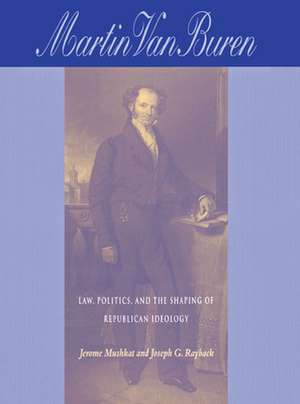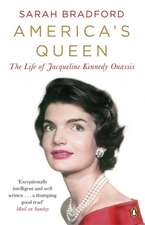Martin Van Buren: Law, Politics, and the Shaping of Republican Ideology
Autor Jerome Mushkat, Joseph G. Raybacken Limba Engleză Hardback – 9 oct 1997
In 1828, Martin Van Buren discontinued his profession as a lawyer to become a full-time politician, yet his formative years as an attorney provided the critical ideological basis for his presidency. Mushkat and Rayback offer the first historical investigation of the nature, scope, and significance of Van Buren's legal practice as they trace the development of his republican ideology.
Rather than a static set of immutable values and imperatives, Van Buren's ideology was a malleable body of thought. Dynamic and evolving, it exemplified the complexities of republicanism itself. As a teenager, Van Buren absorbed Jefforson and Madison's eighteenth-century classical republicanism. Later, the principles of classical republicanism provided guides during his first years as a practicing lawyer. As his legal and political careers developed, Van Buren adapted his ideas to new conditions, accepting key components of liberal republicanism.
Van Buren's rise to prominence mirrors the relevance of law to politics. As a New York attorney, Van Buren worked with legal issues in the nation's most important state during the early nineteenth century. His key contributions were Americanization of the common law and modernization of contract law. His experience also helped shape his perspectives on such matters as the allocation and use of power, judicial activism and legislative supremacy, and property and gender rights.
Consulting a wide range of original legal sources not previously used by historians, Mushkat and Rayback offer a fresh and intriguing biographical approach to an American president that challenges traditional perceptions and adds new insight into Van Buren's place in American political and legal history.
Rather than a static set of immutable values and imperatives, Van Buren's ideology was a malleable body of thought. Dynamic and evolving, it exemplified the complexities of republicanism itself. As a teenager, Van Buren absorbed Jefforson and Madison's eighteenth-century classical republicanism. Later, the principles of classical republicanism provided guides during his first years as a practicing lawyer. As his legal and political careers developed, Van Buren adapted his ideas to new conditions, accepting key components of liberal republicanism.
Van Buren's rise to prominence mirrors the relevance of law to politics. As a New York attorney, Van Buren worked with legal issues in the nation's most important state during the early nineteenth century. His key contributions were Americanization of the common law and modernization of contract law. His experience also helped shape his perspectives on such matters as the allocation and use of power, judicial activism and legislative supremacy, and property and gender rights.
Consulting a wide range of original legal sources not previously used by historians, Mushkat and Rayback offer a fresh and intriguing biographical approach to an American president that challenges traditional perceptions and adds new insight into Van Buren's place in American political and legal history.
Preț: 385.40 lei
Nou
Puncte Express: 578
Preț estimativ în valută:
73.75€ • 80.36$ • 62.14£
73.75€ • 80.36$ • 62.14£
Carte tipărită la comandă
Livrare economică 23 aprilie-07 mai
Preluare comenzi: 021 569.72.76
Specificații
ISBN-13: 9780875802299
ISBN-10: 087580229X
Pagini: 271
Dimensiuni: 152 x 229 x 23 mm
Greutate: 0.62 kg
Ediția:1
Editura: Northern Illinois University Press
Colecția Northern Illinois University Press
ISBN-10: 087580229X
Pagini: 271
Dimensiuni: 152 x 229 x 23 mm
Greutate: 0.62 kg
Ediția:1
Editura: Northern Illinois University Press
Colecția Northern Illinois University Press
Recenzii
"Fills a long-standing gap."—Choice
"An imaginative, sophisticated, clearly written study that contributes greatly to our understanding of Van Buren, the law, and the role of republicanism."—Journal of the Early Republic
"One of the best studies of the relationship of law and politics in early nineteenth-century New York."—New York History
"An imaginative, sophisticated, clearly written study that contributes greatly to our understanding of Van Buren, the law, and the role of republicanism."—Journal of the Early Republic
"One of the best studies of the relationship of law and politics in early nineteenth-century New York."—New York History
Cuprins
Table of Contents
Preface
One: The Making of a Republican Dual Career
Two: Legal Training, the Dual Career, and Republicanism
Three: The Dual Career Begins
Four: Republicanism in Law and Politics
Five: Republicanism and Property Law
Six: Distributive Justice and Legal Instrumentalism
Seven: Becoming a Republican State Attorney General
Eight: Republicanism and State Attorney General: Phase One
Nine: Republicanism and State Attorney General: Phase Two
Ten: Republicanism in a New Era
Eleven: The Dual Career Ends
Twelve: Martin Van Buren's Legal and Political World
Notes
Bibliography
Index
One: The Making of a Republican Dual Career
Two: Legal Training, the Dual Career, and Republicanism
Three: The Dual Career Begins
Four: Republicanism in Law and Politics
Five: Republicanism and Property Law
Six: Distributive Justice and Legal Instrumentalism
Seven: Becoming a Republican State Attorney General
Eight: Republicanism and State Attorney General: Phase One
Nine: Republicanism and State Attorney General: Phase Two
Ten: Republicanism in a New Era
Eleven: The Dual Career Ends
Twelve: Martin Van Buren's Legal and Political World
Notes
Bibliography
Index
Descriere
In 1828, Martin Van Buren discontinued his profession as a lawyer to become a full-time politician, yet his formative years as an attorney provided the critical ideological basis for his presidency. Mushkat and Rayback offer the first historical investigation of the nature, scope, and significance of Van Buren's legal practice as they trace the development of his republican ideology.
Rather than a static set of immutable values and imperatives, Van Buren's ideology was a malleable body of thought. Dynamic and evolving, it exemplified the complexities of republicanism itself. As a teenager, Van Buren absorbed Jefforson and Madison's eighteenth-century classical republicanism. Later, the principles of classical republicanism provided guides during his first years as a practicing lawyer. As his legal and political careers developed, Van Buren adapted his ideas to new conditions, accepting key components of liberal republicanism.
Van Buren's rise to prominence mirrors the relevance of law to politics. As a New York attorney, Van Buren worked with legal issues in the nation's most important state during the early nineteenth century. His key contributions were Americanization of the common law and modernization of contract law. His experience also helped shape his perspectives on such matters as the allocation and use of power, judicial activism and legislative supremacy, and property and gender rights.
Consulting a wide range of original legal sources not previously used by historians, Mushkat and Rayback offer a fresh and intriguing biographical approach to an American president that challenges traditional perceptions and adds new insight into Van Buren's place in American political and legal history.
Rather than a static set of immutable values and imperatives, Van Buren's ideology was a malleable body of thought. Dynamic and evolving, it exemplified the complexities of republicanism itself. As a teenager, Van Buren absorbed Jefforson and Madison's eighteenth-century classical republicanism. Later, the principles of classical republicanism provided guides during his first years as a practicing lawyer. As his legal and political careers developed, Van Buren adapted his ideas to new conditions, accepting key components of liberal republicanism.
Van Buren's rise to prominence mirrors the relevance of law to politics. As a New York attorney, Van Buren worked with legal issues in the nation's most important state during the early nineteenth century. His key contributions were Americanization of the common law and modernization of contract law. His experience also helped shape his perspectives on such matters as the allocation and use of power, judicial activism and legislative supremacy, and property and gender rights.
Consulting a wide range of original legal sources not previously used by historians, Mushkat and Rayback offer a fresh and intriguing biographical approach to an American president that challenges traditional perceptions and adds new insight into Van Buren's place in American political and legal history.










